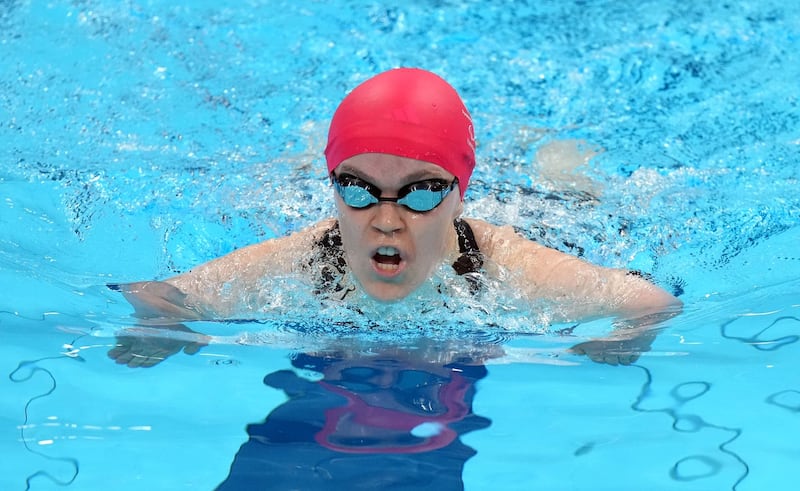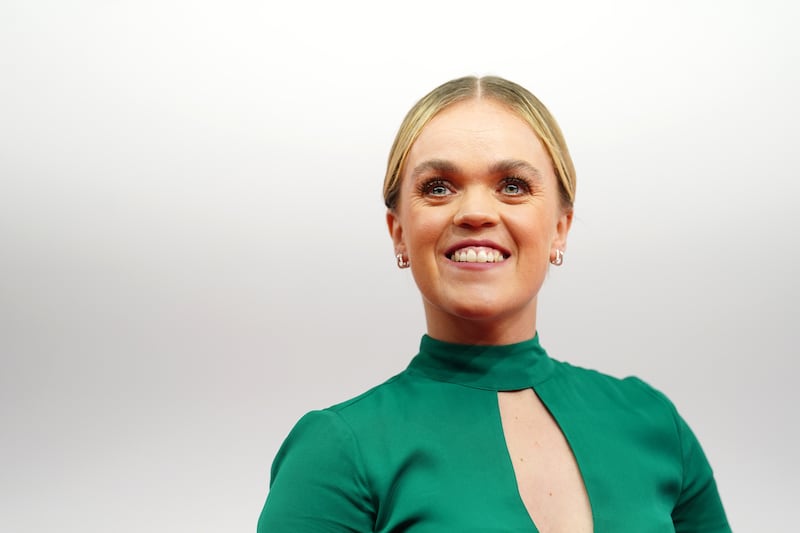Ellie Simmonds has revealed that she has struggled with “a lot of self-doubt” and “not feeling good enough” in the past year, as she paves a new career in TV.
The former swimmer, one of Britain’s most celebrated Paralympians, with a total of eight Paralympic medals – including two golds when she was just 13 in Beijing – retired in 2021 after the Tokyo Games.
The 29-year-old, who was part of the presenting team for Paris 2024 for Eurosport and will be covering the Paralympics for Channel 4, from August 28, says the past year has been tough.
“[I’m] finding my identity in a way, finding that confidence, and I definitely have a lot of self-doubt at the moment. Just doubting my abilities and doubting I can do things.”

Simmonds, who was born was with achondroplasia, a genetic form of dwarfism, says: “Some days I feel like I can do everything and I’m alright, but then you have some days where you feel like you can’t do it, you’re not capable and you’re not good enough.
“Because you see people and you compare yourself to other people.
“I’m a very much an over-thinker as well. Sometimes I do say silly things or wrong things, and I’m like, oh gosh, Ellie, why did you do that?
“As an athlete and a swimmer, you know what you’re good at, and you do it every single day. You have a four-year plan, you have a year plan… and then all of a sudden that goes out the window.”
“Now I’m trying to figure out, what do I enjoy? What am I good at?”
Being in front of the camera for the Olympics and soon Paralympics, rather than in the pool for the first time, has been an interesting shift, she notes.
“It’s been amazing to still be part of that whole Olympic buzz, but just in a different capacity. I have missed it.
“I know what the athletes are feeling like, the whole nerves, the excitement, the adrenaline, especially when a race goes well, the buzz of it all and that the excitement, but in a way, now I’m doing it in a different way.
“Showing my personality as well [on TV], just me being me, and just hopefully using my expertise in in swimming, in the world of sport.”
Live TV does have some similarities to professional sport though. “It’s still the thrill, still the exact same thing that you’ve got to nail it, you’ve got to do the right thing, say the right things and perform at the right things, like in front of [an audience] again.”
Simmonds also starred on Strictly Come Dancing in 2022 and fronted documentaries such as BBC’s Ellie Simmonds: A World Without Dwarfism? and ITV’s Ellie Simmonds: Finding My Secret Family, which focused on her adoption and attempt to find her birth mother.
Being adopted, it was particularly interesting for Simmonds to look into her genetic make up as one of 15 top athletes taking part in a campaign for Ancestry. Each had their DNA analysed to launch a new interactive DNA experience so people can compare their own traits to top sports stars, like Simmonds, Nicola Adams and Kriss Akabusi.
The former professional swimmer unsurprisingly scored above average on oxygen use and determination, but says: “I’m bad at a bat and ball. I’m less likely to be a high jumper. I am less likely to be a leader.
“I found out with choreography skills, I find it really hard to learn – now I know why it was so hard on Strictly and I tested Nikita [Kuzmin, her professional dance partner]’s patience!
“It’s been fascinating because being adopted, you’ve got all these answers and you’ve got all these questions.
“It’s really interesting to see what does come from nature and what comes from nurture.
“A lot of the stuff, I know what I’m like and because of who I live with now, my parents, they’ve been about to nurture that into the right direction.”
She loved swimming from the age of five, and by 13 had become Team GB’s youngest athlete at the summer Paralympics in Beijing 2008, competing in many events in the S6 category. She received an MBE in 2009 – the youngest ever person to do so.

She still swims once a week. “Just to hit the walls for 30 minutes, just to swim, just to stay connected again.
“You’ve got 30 minutes where it’s just you and your mind going up and down, just being one with the water. It helps me mentally more than anything else.
“Because I’ve done it for so long, I don’t need to think about moving my arms or the legs – it just happens. Sometimes I’m like, where am I? Where am I in the pool? I realise I’ve switched off.”
It feels important to do “something that I was good at for so long”, she says. “I wouldn’t be where I am today without it.”
To keep fit she also does bootcamp classes, reformer Pilates and gym work, and she frames fitness in a different way now.
“Exercise is amazing. It’s good for your body, it’s good for your mental health. But you know what? If it doesn’t happen, it’s not the end of the world. So it’s just doing it for for fun, doing it for your feelings, doing it for mentally feeling good, physically feeling good, and just doing it when you can.”
Her secret to staying motivated is to exercise in the mornings.

“I try and just get my gym stuff out on the floor before I go to bed. So then I set my alarm, have a coffee, and then go, and then it’s done. For me, training in the afternoon and evening just doesn’t work,” Simmonds says.
But, since retiring, there’s been an element of having to reaccept her new body – that’s not sculpted with hours of pool training and tailored nutrition.
“When I was an athlete, I was pushing my body to its limits every day. I was very strong. I could eat what I wanted, in a way, and then all of a sudden, that exercise and that whole routine goes and your body does change.
“And also it’s hard, because I think, as a woman, you compare your body to how it was in the past, and you look at yourself think, Gosh, why can’t I be like that again?”
She’s had to tell herself, “I’m not an athlete anymore”.
Saying: “I’m thankful I still get to do exercise, and I love doing exercise. Yes, my body’s not as strong, or not as thin or skinny as it used to be. But at this moment, I’m quite happy with with my body.”
See how you measure up against world-class athletes with the launch of 30 new AncestryDNA® genetic performance traits that can impact physical performance, at Ancestry.co.uk.








